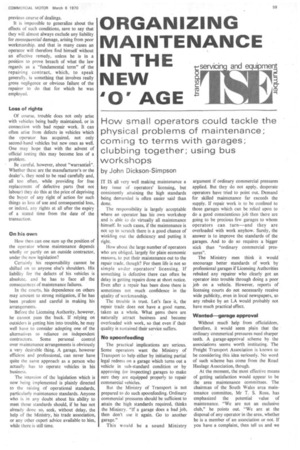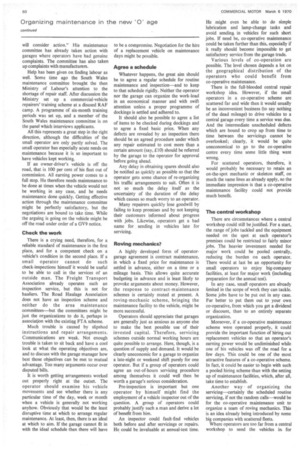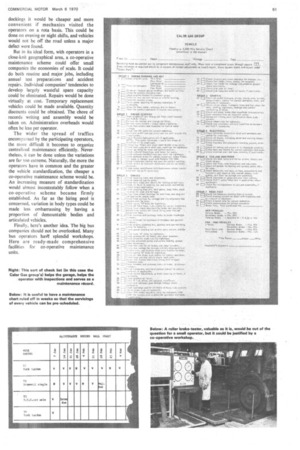ORGANIZING MAINTENANCE IN THE NEW '0' AGE
Page 61

Page 62

Page 63

If you've noticed an error in this article please click here to report it so we can fix it.
How small operators could tackle the physical problems of maintenance; coming to terms with garages; clubbing together; using bus workshops
by John Dickson-Simpson
IT IS all very well making maintenance a key issue of operators' licensing, but consistently attaining the high standards being demanded is often easier said than done.
The responsibility is largely acceptable where an operator has his own workshop and is able to do virtually all maintenance himself. In such cases, if the maintenance is not up to scratch there is a good chance of winkling out the deficiency and putting it right.
How about the large number of operators who are obliged, largely for plain economic reasons, to put their maintenance out to the repair trade, though? For them life is not so simple under operators' licensing. If something is defective there can often be delay in getting repairs done at short notice. Even after a repair has been done there is sometimes not much confidence in the qtiality of workmanship.
The trouble is trust. Let's face it, the repair trade does not have a good name, taken as a whole. What gems there are naturally attract business and become overloaded with work, so that even if their quality is sustained their service suffers.
No spoonfeeding The practical implications are serious. Some operators want the Ministry of Transport to help either by initiating partial legal redress on a garage Which turns out a vehicle in sub-standard condition or by approving (or inspecting) garages to make sure they are equipped properly to repair commercial vehicles.
But the Ministry of Transport is not prepared to do such spoonfeeding. Ordinary commercial pressures should be sufficient to attain the high standards required, thinks the Ministry. "If a garage does a bad job, then don't use it again. Go to another garage."
This would be a sound Ministry argument if ordinary commercial pressures applied. But they do not apply, desperate operators have tried to point out. Demand for skilled maintenance far exceeds the supply. If repair work is to be confined to those garages which can be relied upon to do a good conscientious job then there are going to be precious few garages to whom operators can turn--and they are overloaded with work anyhow. Surely, the answer is to improve the standards of the garages. And to do so requires a bigger stick than "ordinary commercial pressures".
The Ministry men think it would encourage better standards of work by professional garages if Licensing Authorities rebuked any repairer who clearly got an operator into trouble through doing a poor job on a vehicle. However, reports of licensing courts do not necessarily receive wide publicity, even in local newspapers, so any rebuke by an LA would probably not have much practical effect.
Wanted—garage approval Without muck help from officialdom, therefore, it would seem plain that the • ordinary commerical pressures need sharper teeth. A garage-approval scheme by the associations seems worth instituting. The Freight Transport Association is known to be considering this idea seriously. No word of such scheme has come from the Road Haulage Association, though.
At the moment, the most effective means of getting satisfaction would appear to be the area maintenance committees. The chairman of the South Wales area maintenance committee, Mr T. S. Ross, has emphasized the potential value of maintenance. "We are not an exclusive club," he points out. "We are at the disposal of any operator in the area, whether he is a member of an association or not. If you have a complaint, then tell us and we will consider action." His maintenance committee has already taken action with garages where operators have had genuine complaints. The committee has also taken up complaints with manufacturers.
Help has been given on finding labour as well. Some tune ago the South Wales maintenance committee brought the then Ministry of Labour's attention to the shortage of repair staff. After discussion the Ministry set up a commercial-vehicle repairers' training scheme at a disused RAF camp. A programme of six-month training periods was set up, and a member of the South Wales maintenance committee is on the panel which interviews applicants.
All this represents a great step in the right direction, although the difficulties of the small operator are only partly solved. The small operator has especially acute needs on maintenance because it is so important to have vehicles kept working.
If an owner-driver's vehicle is off the road, that is 100 per cent of his fleet out of commission. All earning power comes to a full stop. He therefore needs maintenance to be done at times when the vehicle would not be working in any case, and he needs maintenance done quickly. Getting effective action through the maintenance committee might be perfectly satisfactory, but the negotiations are bound to take time. While the arguing is going on the vehicle might be off the road under order of a GV9 notice.
Check the work There is a crying need, therefore, for a reliable standard of maintenance in the first place, and for a competent check on a vehicle's condition in the second place. If a small operator cannot do such check-inspections himself it would be useful to be able to call in the services of an outside man. The Freight Transport Association already operates such an inspection service, but this is not for hauliers. The Road Haulage Association does not have an inspection scheme and neither do the area maintenance committees—but the committees might be just the organizations to do it, perhaps in association with the existing FTA scheme.
Much trouble is caused by slipshod instructions and repair arrangements. Communications are weak. Not enough trouble is taken to sit back and have a cool look at what the operating objectives are, and to discuss with the garage manager how best those objectives can be met to mutual advantage. Too many arguments occur over disputed bills.
It is worth getting arrangements worked out properly right at the outset. The operator should examine his vehicle movements and see whether there is any particular time of the day, week or month when a vehicle is generally not working anyhow. Obviously that would be the least disruptive time at which to arrange regular maintenance. At least, then, there is an ideal at which to aim. If the garage cannot fit in with the ideal schedule then there will have to be a compromise. Negotiation for the hire of a replacement vehicle on maintenance days might be possible.
Agree a schedule Whatever happens, the great aim should be to agree a regular schedule for routine maintenance and inspection—and to keep to that schedule rigidly. Neither the operator nor the garage can organize the work-load in an economical manner and with swift attention unless a proper programme of dockings is settled and adhered to.
It should also be possible to agree a list of items to be checked during dockings and to agree a fixed basic price. When any defects are revealed by an inspection there should be an agreed procedure under which any repair estimated to cost more than a certain amount (say, £.10) should be referred by the garage to the operator for approval before going ahead.
Any delay in obtaining spares should also be notified as quickly as possible so that the operator gets some chance of re-organizing his traffic arrangements to suit. Often it is not so much the delay itself as the uncertainty of the duration of the delay which causes so much worry to an operator.
Many repairers quickly lose goodwill by failing to keep promises and by not keeping their customers informed about progress with jobs. Likewise, operators get a bad name for sending in vehicles late for servicing.
Roving mechanics?
A highly developed form of operatorgarage agreement is contract maintenance, in which a fixed price for maintenance is settled in advance, either on a time or a mileage basis. This allows quite accurate budgeting in advance and is least likely to provoke arguments about money. However, the response to contract-maintenance schemes is certainly muted at present. A roving-mechanic scheme, bringing the maintenance facility to the vehicle, might be more successful.
Operators should appreciate that garages are generally just as anxious as anyone else to make the best possible use of their invested capital. Therefore, servicing schemes outside normal working hours are quite possible to arrange. Here, though, is a question of supply and demand. It would be clearly uneconomic for a garage to organize a late-night or weekend shift purely for one operator. But if a group of operators could agree an out-of-hours servicing procedure among themselves it could well then be worth a garage's serious consideration.
Pre-inspection is important but one operator by himself might find the employment of a vehicle inspector out of the question. A group of operators could probably justify such a man and derive a lot of benefit from him.
An inspector could fault-find vehicles both before and after servicings or repairs. He could be invaluable at annual-test time.
He might even be able to do simple lubrication and lamp-change tasks and avoid sending, in vehicles for such short jobs. If need be, co-operative maintenance could be taken further than this, especially if it really should become impossible to get satisfactory service from the garage trade.
Various levels of co-operation are possible. The level chosen depends a lot on the geographical distribution of the operators who could benefit from co-operative maintenance.
There is the full-blooded central repair workshop idea. However, if the small operators in a co-operative scheme are scattered far and wide then it would usually be an inconvenient business (to say nothing of the dead mileage) to drive vehicles to a central garage every time a service was due. And the intermediate unscheduled defects which are bound to crop up from time to time between the servicings cannot be overlooked; clearly, it would be quite uneconomical to go to the co-operative centre every time some little thing went wrong.
For scattered operators, therefore, it would probably be necessary to retain an on-the-spot mechanic or skeleton staff, on much the same lines as already apply, so the immediate impression is that a co-operative maintenance facility could not provide much benefit.
The central workshop There are circumstances where a central workshop could still be justified. For a start, the range of jobs tackled and the equipment needed on the spot at each operator's premises could be restricted to fairly minor jobs. The heavier investment needed for major work could be pooled centrally, reducing the burden on each operator. There would at last be an opportunity for small operators to enjoy big-company facilities, at least for major work (including preparation for the annual test).
In any case, small operators are already limited in the scope of work they can tackle. Some jobs have to be put out in any case. Far better to put them out to your own co-operative, from which you get a dividend or discount, than to an entirely separate organization.
Moreover, if a co-operative maintenance scheme were operated properly, it could provide the important function of hiring out replacement vehicles so that an operator's earning power would be undiminished while one of his vehicles was off the road for a few days. This could be one of the most attractive features of a co-operative scheme. In fact, it could be easier to begin with such a pooled hiring scheme than with the setting up of maintenance facilities, which, after all, take time to establish.
Another way• of organizing the servicing—certainly the scheduled routine servicing, if not the random calls—would be for the co-operative maintenance unit to organize a team of roving mechanics. This is an idea already being introduced by some big companies with scattered fleets.
Where operators are too far from a central workshop to send the vehicles in for dockings it would be cheaper and more convenient if mechanics visited the operators on a rota basis. This could be done on evening or night shifts, and vehicles would not be off the road unless a major defect were found.
But in its ideal form, with operators in a close-knit geographical area, a co-operative maintenance scheme could offer small companies the economies of scale. It could do both routine and major jobs, including annual test preparations and accident repairs. Individual companies' tendencies to develop largely wasteful spare capacity could be eliminated. Repairs would be done virtually at cost. Temporary replacement vehicles could be made available. Quantity discounts could be obtained. The chore of records writing and assembly would be taken on. Administration overheads would often be less per operator.
The wider the spread of traffics encompsed by the participating operators, the more difficult it becomes to organize central i ed maintenance efficiently. Nevertheless, it can be done unless the variations are far too extreme. Naturally, the more the operators have in common and the greater the vehicle standardization, the cheaper a co-operative maintenance scheme would be. An increasing measure of standardization would almost incontestably follow when a co-operative scheme became firmly established. As far as the hiring pool is concerned, variation in body types could be made less embarrassing by having a proportion of demountable bodies and articulated vehicles.
Finally, here's another idea. The big bus companies should not be overlooked. Many bus operators hale splendid workshops. Here are ready-made comprehensive facilities for co-operative maintenance units.




























































































































































